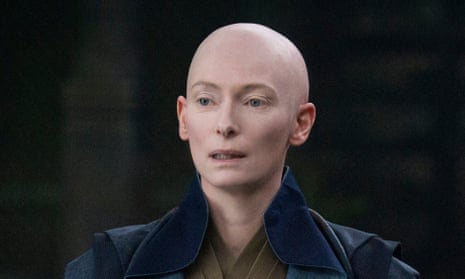The row over the casting of Tilda Swinton as the Ancient One in Marvel’s Doctor Strange has been reignited, with one group saying the film has been tarnished by the “whitewashing” of the character.
The Media Action Network for Asian Americans attacked the decision to cast Swinton in a role that had been Asian in the comics from which the film was adapted.
“Given the dearth of Asian roles, there was no reason a monk in Nepal could not be Asian,” Manaa president Rob Chan said, as reported by Variety. “Had [writer/director Scott] Derrickson cast an Asian as the revered leader who guides the main character to become a better human being and to develop his sorcery powers, it would’ve given a big boost to that actor’s career. While actresses deserve the kinds of bold roles usually reserved for men, white actresses are seen onscreen more than Asians of any gender. And Tilda Swinton can afford to turn down roles.”
Marvel has previously defended the casting of Swinton, saying: “The Ancient One is a title that is not exclusively held by any one character, but rather a moniker passed down through time, and in this particular film the embodiment is Celtic.” The depiction of the character in the comics was widely considered to be outdated and racist.
Screenwriter Robert Cargill has suggested that the decision was taken in order not to lose China’s lucrative box office.
“He originates from Tibet,” Cargill said, “so if you acknowledge that Tibet is a place and that he’s Tibetan, you risk alienating one billion people who think that that’s bullshit and risk the Chinese government going, ‘Hey, you know one of the biggest film-watching countries in the world? We’re not going to show your movie because you decided to get political.’”
Derrickson has also explained the decision not to cast an Asian after the Ancient One was written as female.
“We talked about Asian actors who could do it, as we were working on the script … but when I envisioned that character being played by an Asian actress, it was a straight-up Dragon Lady.”
“I just didn’t feel like there was any way to get around that because the Dragon Lady, by definition, is a domineering, powerful, secretive, mysterious, Asian woman of age with duplicitous motives – and I just described Tilda’s character. I really felt like I was going to be contributing to a bad stereotype.”
Manaa’s Guy Aoki disagreed, lamenting the under-representation of Asians in the Marvel canon. “So the Ancient One was racist and stereotyped, but letting a white woman play the part erases all that? No, it just erases an Asian character from the screen when there weren’t many prominent Asian characters in Marvel films to begin with,” he told Variety.
“Ninety per cent of Marvel and DC characters were originally white. So, in order to be more inclusive in their movies, both companies have tried to change these characters to minorities. But they’re almost always black.”
Asians are under-represented in Hollywood generally. One study found that just 4.4% of speaking roles in major films went to Asian actors, despite making up 5.3% of the US population, and that they are even less likely to appear in a leading role.

Comments (…)
Sign in or create your Guardian account to join the discussion